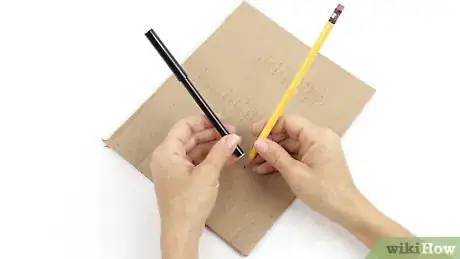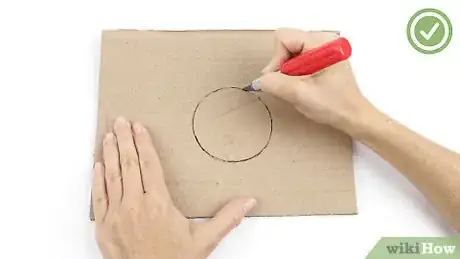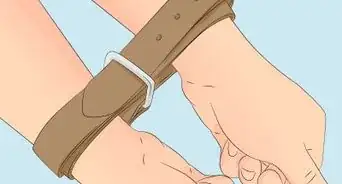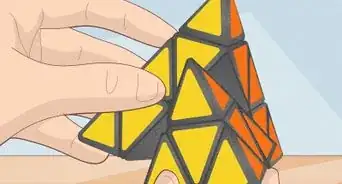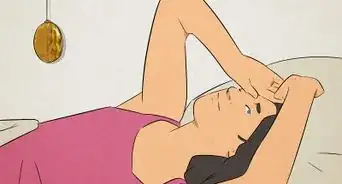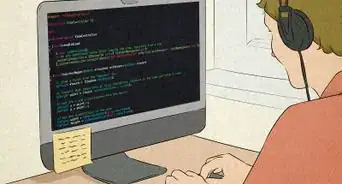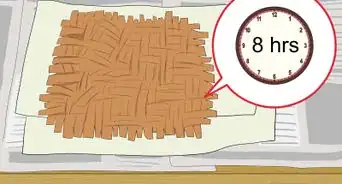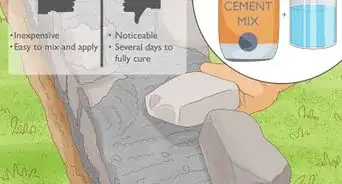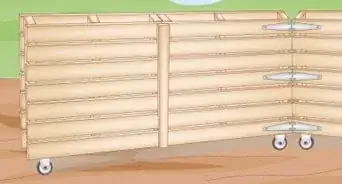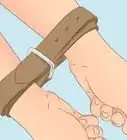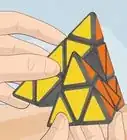This article was co-authored by wikiHow Staff. Our trained team of editors and researchers validate articles for accuracy and comprehensiveness. wikiHow's Content Management Team carefully monitors the work from our editorial staff to ensure that each article is backed by trusted research and meets our high quality standards.
There are 10 references cited in this article, which can be found at the bottom of the page.
The wikiHow Video Team also followed the article's instructions and verified that they work.
This article has been viewed 99,599 times.
Learn more...
So, you’re in need of a perfect circle. No matter what project you’re working on, tracing a perfectly symmetrical circle can seem daunting. Luckily, with a few tricks, it can be as easy as spelling your own name! Don’t believe us? Keep reading to learn how you can trace a circle with a DIY compass and cut it out effortlessly with scissors or a craft knife.
Steps
Tracing Your Circle
-
1Grab a pencil or marker to trace your circle. To cut your circle well, you need to trace it on the cardboard first. Use a pencil if you don't want the lines to show as much. Otherwise, a marker will make a nice, clear line for you to cut.
-
2Use a compass to draw any size circle you want. Unscrew the hinge at the top of the compass to move the arms; the distance between the 2 points will make up the radius of your circle, which means it will be half the size of the final circle. Tighten the hinge when you have it to the size you want. Set the sharp point in the middle of your circle with the compass straight up so the pencil hits the cardboard, too. Push down on the needle part, and twist the top of the compass to turn it in a circle, which will be marked with the pencil.[1]
- If the pencil isn't close enough to the paper, you can unscrew the small screw on its side. Pull the pencil down some. It should hit the cardboard while the sharp point of the compass is straight up and down. When you get it adjusted, tighten the screw again.
- A compass is a hinged instrument with 2 arms. One arm has a sharp point, and the other holds a pencil.
- The size of the circle you can draw will be limited by how long the arms of the compass are.
Advertisement -
3Try a thumbtack and a piece of string for a large circle. If you need a bigger circle, make a loop out of yarn and stretch it so it's taut. The length will be the radius (halfway across) the circle. Press a thumbtack into the cardboard where you want the center of the circle to be and loop the yarn over it. Then, place the pencil in the outer edge of the yarn loop. Stretch the string taut and move the pencil around the thumbtack, pressing down to make a mark as you do.[2]
- This circle may not be quite as precise as a compass, but it will likely do for most projects.
-
4Trace around a circular object for an easy fix. If your circle doesn't need to be a precise size, this fix is an easy one. Find a circular jar lid or one for a plastic food container in the size you need. Hold it down on the paper and trace around it with a pencil or marker.[3]
- Try coffee can lids or bucket lids for bigger circles.
Using Scissors
-
1Pick a sharp, inexpensive pair of scissors. Cardboard tends to dull scissors quickly, so you may want to choose a pair that's not too expensive. Alternatively, invest in a pair of scissors specifically made for cardboard if you plan on cutting it often.[4]
- An inexpensive pair is a good choice because they won't cost you too much to replace when they become dull.
-
2Remove the excess cardboard around the circle. If you have a lot of cardboard around the circle you want to cut, it will be more difficult to guide your scissors around the circle. Use your scissors to quickly slice a larger circle or square around the circle you want to cut out.[5]
- If you want a negative space circle (a piece of cardboard with a hole cut in it that's perfectly circular), carefully stab one side of the scissors through the center of the circle to start making your cut.
-
3Slice the extra cardboard into sections by cutting toward the circle from the outside. Cut a line from the edge of the cardboard in toward the circle. Stop right when you get to the circle. Move over 0.75 to 1 inch (1.9 to 2.5 cm) to the right or left and make another cut. Go all the way around the circle this way so that cardboard around the circle is all cut into finger-like sections.[6]
- This process helps make cutting the curve of the circle easier. Otherwise, the cardboard may bend as you move around the circle.
- If you're wanting to cut out the inside and leave the outside in place, cut the sections from the middle of the circle out to the edge.
-
4Cut around the circle. Go between 2 of the sections you cut and start moving around the circle with your scissors. The sections will fall off as you do. Cut all the way around, and you have your circle.[7]
Working with a Craft Knife
-
1Pick a very sharp craft or box cutter. A box cutter or contractor's knife will work well for thick cardboard. A craft knife or scalpel-type knife is better for thinner cuts. Either way, the blade needs to be very sharp to cut through the cardboard.[8]
- Make sure to work over a surface you don't mind cutting, such as a self-healing cutting mat.
-
2Cut around the circle in small strokes. Move around the circle using small strokes; don't try to make it one long stroke. Also, don't try to go completely through the cardboard. It won't cut cleanly, and you may hurt yourself trying to apply too much pressure.[9]
- Always aim the knife away from yourself not in toward your body.
-
3Go over the circle again to cut all the way through the cardboard. Run the craft knife over the circle again, tracing the cut you already made. If you need to, repeat the process a third time to go all the way through the cardboard.[10]
- Because it's curved, continue to make little cuts as you move around instead of one big slice.
-
4Keep your fingers out of the cutting path. Always pay attention to the path of the blade and make sure you don't have your fingers across it. The blade could slip, and you could end up with a nasty cut if you're not careful.[11]
Things You'll Need
- Compass, thumbtack and yarn, or a guide
- Scissors or a craft knife
- Proper cutting surface, such as a self-healing cutting mat
- Cardboard
References
- ↑ https://www.mathsteacher.com.au/year8/ch10_geomcons/03_circles/comp.htm
- ↑ https://learn.adafruit.com/cardboard-fundamentals/cutting-tools-and-techniques
- ↑ https://learn.adafruit.com/cardboard-fundamentals/cutting-tools-and-techniques
- ↑ https://learn.adafruit.com/cardboard-fundamentals/cutting-tools-and-techniques
- ↑ https://www.youtube.com/watch?v=IKMmU2B2i54&feature=youtu.be&t=2
- ↑ https://www.youtube.com/watch?v=IKMmU2B2i54&feature=youtu.be&t=10
- ↑ https://www.youtube.com/watch?v=IKMmU2B2i54&feature=youtu.be&t=20
- ↑ https://learn.adafruit.com/cardboard-fundamentals/cutting-tools-and-techniques
- ↑ https://learn.adafruit.com/cardboard-fundamentals/cutting-tools-and-techniques
